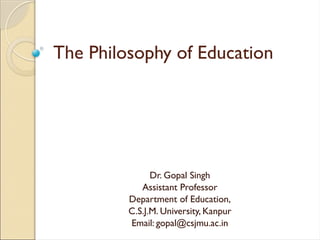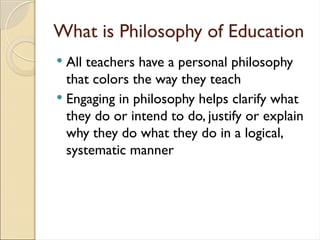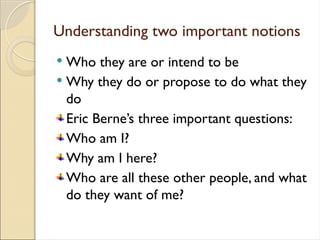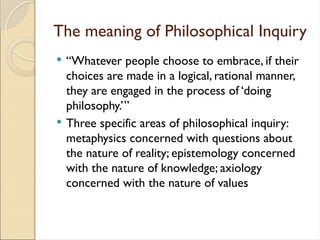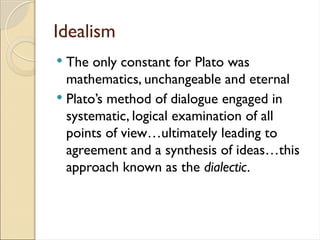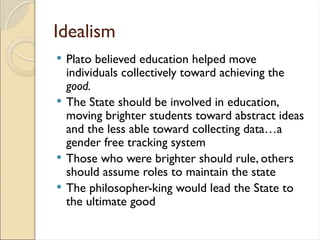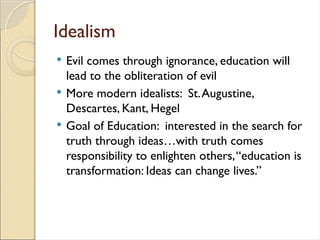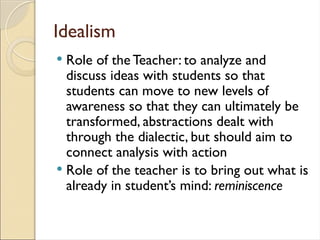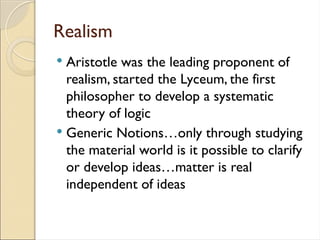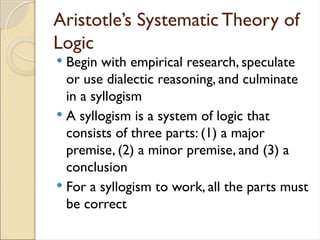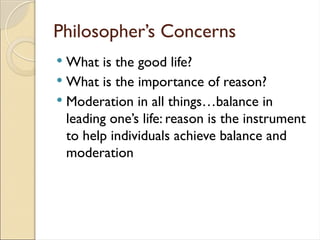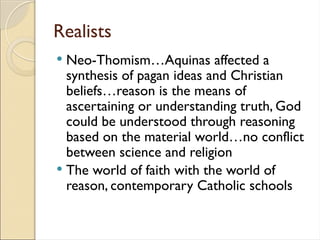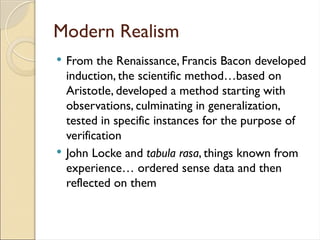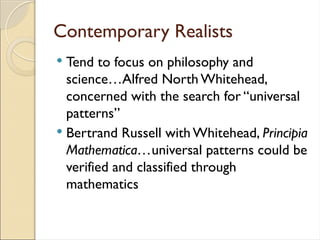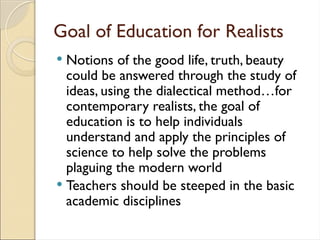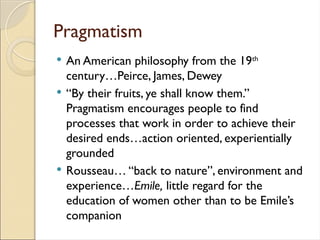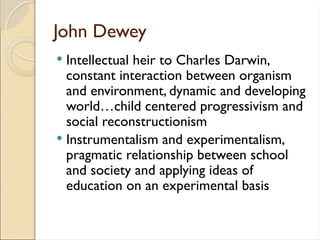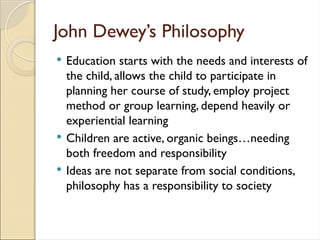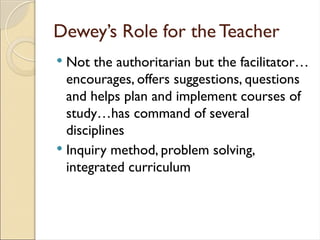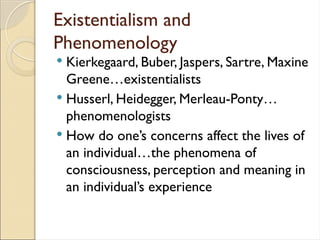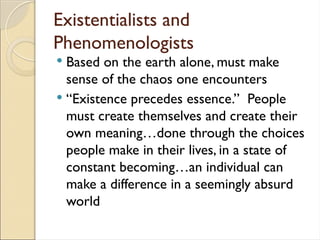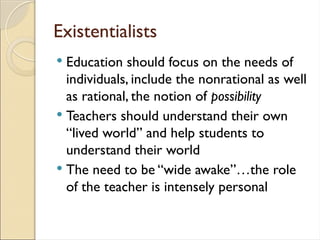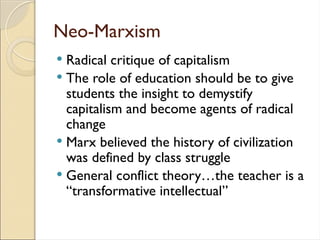Philosophy.pptx about Philosophy in Education
- 1. The Philosophy of Education Dr. Gopal Singh Assistant Professor Department of Education, C.S.J.M. University, Kanpur Email: gopal@csjmu.ac.in
- 2. What is Philosophy of Education ´éù All teachers have a personal philosophy that colors the way they teach ´éù Engaging in philosophy helps clarify what they do or intend to do, justify or explain why they do what they do in a logical, systematic manner
- 3. Understanding two important notions ´éù Who they are or intend to be ´éù Why they do or propose to do what they do Eric BerneÔÇÖs three important questions: Who am I? Why am I here? Who are all these other people, and what do they want of me?
- 4. The meaning of Philosophical Inquiry ´éù ÔÇ£Whatever people choose to embrace, if their choices are made in a logical, rational manner, they are engaged in the process of ÔÇÿdoing philosophy.ÔÇÖÔÇØ ´éù Three specific areas of philosophical inquiry: metaphysics concerned with questions about the nature of reality; epistemology concerned with the nature of knowledge; axiology concerned with the nature of values
- 5. Particular Philosophies of Education ´éù Idealism, the first systematic philosophy in Western thoughtÔǪSocrates and Plato, the Socratic method was dialogue ´éù Generic notions: Philosophers often pose abstract questions that are not easily answered but are concerned with the search for truth ´éù World of matter in constant state of flux, senses are not to be trusted, continually deceive us ´éù Truth is perfect and eternal, but not found in the world of matter, only through the mind
- 6. Idealism ´éù The only constant for Plato was mathematics, unchangeable and eternal ´éù PlatoÔÇÖs method of dialogue engaged in systematic, logical examination of all points of viewÔǪultimately leading to agreement and a synthesis of ideasÔǪthis approach known as the dialectic.
- 7. Idealism ´éù Plato believed education helped move individuals collectively toward achieving the good. ´éù The State should be involved in education, moving brighter students toward abstract ideas and the less able toward collecting dataÔǪa gender free tracking system ´éù Those who were brighter should rule, others should assume roles to maintain the state ´éù The philosopher-king would lead the State to the ultimate good
- 8. Idealism ´éù Evil comes through ignorance, education will lead to the obliteration of evil ´éù More modern idealists: St.Augustine, Descartes, Kant, Hegel ´éù Goal of Education: interested in the search for truth through ideasÔǪwith truth comes responsibility to enlighten others,ÔÇ£education is transformation: Ideas can change lives.ÔÇØ
- 9. Idealism ´éù Role of the Teacher: to analyze and discuss ideas with students so that students can move to new levels of awareness so that they can ultimately be transformed, abstractions dealt with through the dialectic, but should aim to connect analysis with action ´éù Role of the teacher is to bring out what is already in studentÔÇÖs mind: reminiscence
- 10. Methods of Instruction ´éù Lecture from time to time, but primary method of teaching is the dialecticÔǪ discuss, analyze, synthesize, and apply what they have read to contemporary society ´éù CurriculumÔǪimportance of the study of the classicsÔǪmany support a back to the basics approach to education
- 11. Realism ´éù Aristotle was the leading proponent of realism, started the Lyceum, the first philosopher to develop a systematic theory of logic ´éù Generic NotionsÔǪonly through studying the material world is it possible to clarify or develop ideasÔǪmatter is real independent of ideas
- 12. AristotleÔÇÖs Systematic Theory of Logic ´éù Begin with empirical research, speculate or use dialectic reasoning, and culminate in a syllogism ´éù A syllogism is a system of logic that consists of three parts: (1) a major premise, (2) a minor premise, and (3) a conclusion ´éù For a syllogism to work, all the parts must be correct
- 13. PhilosopherÔÇÖs Concerns ´éù What is the good life? ´éù What is the importance of reason? ´éù Moderation in all thingsÔǪbalance in leading oneÔÇÖs life: reason is the instrument to help individuals achieve balance and moderation
- 14. Realists ´éù Neo-ThomismÔǪAquinas affected a synthesis of pagan ideas and Christian beliefsÔǪreason is the means of ascertaining or understanding truth, God could be understood through reasoning based on the material worldÔǪno conflict between science and religion ´éù The world of faith with the world of reason, contemporary Catholic schools
- 15. Modern Realism ´éù From the Renaissance, Francis Bacon developed induction, the scientific methodÔǪbased on Aristotle, developed a method starting with observations, culminating in generalization, tested in specific instances for the purpose of verification ´éù John Locke and tabula rasa, things known from experienceÔǪ ordered sense data and then reflected on them
- 16. Contemporary Realists ´éù Tend to focus on philosophy and scienceÔǪAlfred North Whitehead, concerned with the search for ÔÇ£universal patternsÔÇØ ´éù Bertrand Russell with Whitehead, Principia MathematicaÔǪuniversal patterns could be verified and classified through mathematics
- 17. Goal of Education for Realists ´éù Notions of the good life, truth, beauty could be answered through the study of ideas, using the dialectical methodÔǪfor contemporary realists, the goal of education is to help individuals understand and apply the principles of science to help solve the problems plaguing the modern world ´éù Teachers should be steeped in the basic academic disciplines
- 18. Pragmatism ´éù An American philosophy from the 19th centuryÔǪPeirce, James, Dewey ´éù ÔÇ£By their fruits, ye shall know them.ÔÇØ Pragmatism encourages people to find processes that work in order to achieve their desired endsÔǪaction oriented, experientially grounded ´éù RousseauÔǪ ÔÇ£back to natureÔÇØ, environment and experienceÔǪEmile, little regard for the education of women other than to be EmileÔÇÖs companion
- 19. John Dewey ´éù Intellectual heir to Charles Darwin, constant interaction between organism and environment, dynamic and developing worldÔǪchild centered progressivism and social reconstructionism ´éù Instrumentalism and experimentalism, pragmatic relationship between school and society and applying ideas of education on an experimental basis
- 20. John DeweyÔÇÖs Philosophy ´éù Education starts with the needs and interests of the child, allows the child to participate in planning her course of study, employ project method or group learning, depend heavily or experiential learning ´éù Children are active, organic beingsÔǪneeding both freedom and responsibility ´éù Ideas are not separate from social conditions, philosophy has a responsibility to society
- 21. DeweyÔÇÖs Role for the Teacher ´éù Not the authoritarian but the facilitatorÔǪ encourages, offers suggestions, questions and helps plan and implement courses of studyÔǪhas command of several disciplines ´éù Inquiry method, problem solving, integrated curriculum
- 22. Existentialism and Phenomenology ´éù Kierkegaard, Buber, Jaspers, Sartre, Maxine GreeneÔǪexistentialists ´éù Husserl, Heidegger, Merleau-PontyÔǪ phenomenologists ´éù How do oneÔÇÖs concerns affect the lives of an individualÔǪthe phenomena of consciousness, perception and meaning in an individualÔÇÖs experience
- 23. Existentialists and Phenomenologists ´éù Based on the earth alone, must make sense of the chaos one encounters ´éù ÔÇ£Existence precedes essence.ÔÇØ People must create themselves and create their own meaningÔǪdone through the choices people make in their lives, in a state of constant becomingÔǪan individual can make a difference in a seemingly absurd world
- 24. Existentialists ´éù Education should focus on the needs of individuals, include the nonrational as well as rational, the notion of possibility ´éù Teachers should understand their own ÔÇ£lived worldÔÇØ and help students to understand their world ´éù The need to be ÔÇ£wide awakeÔÇØÔǪthe role of the teacher is intensely personal
- 25. Neo-Marxism ´éù Radical critique of capitalism ´éù The role of education should be to give students the insight to demystify capitalism and become agents of radical change ´éù Marx believed the history of civilization was defined by class struggle ´éù General conflict theoryÔǪthe teacher is a ÔÇ£transformative intellectualÔÇØ
